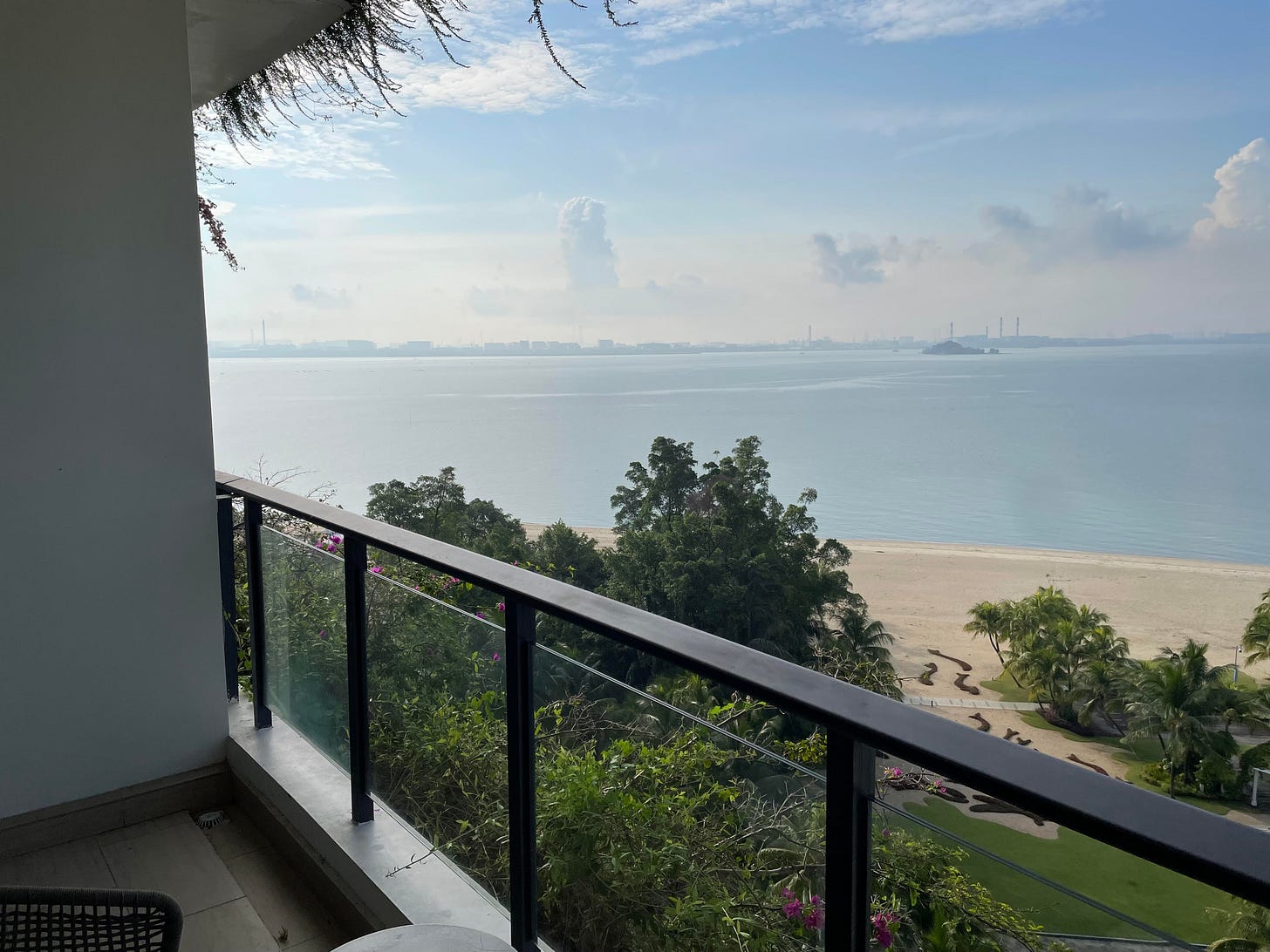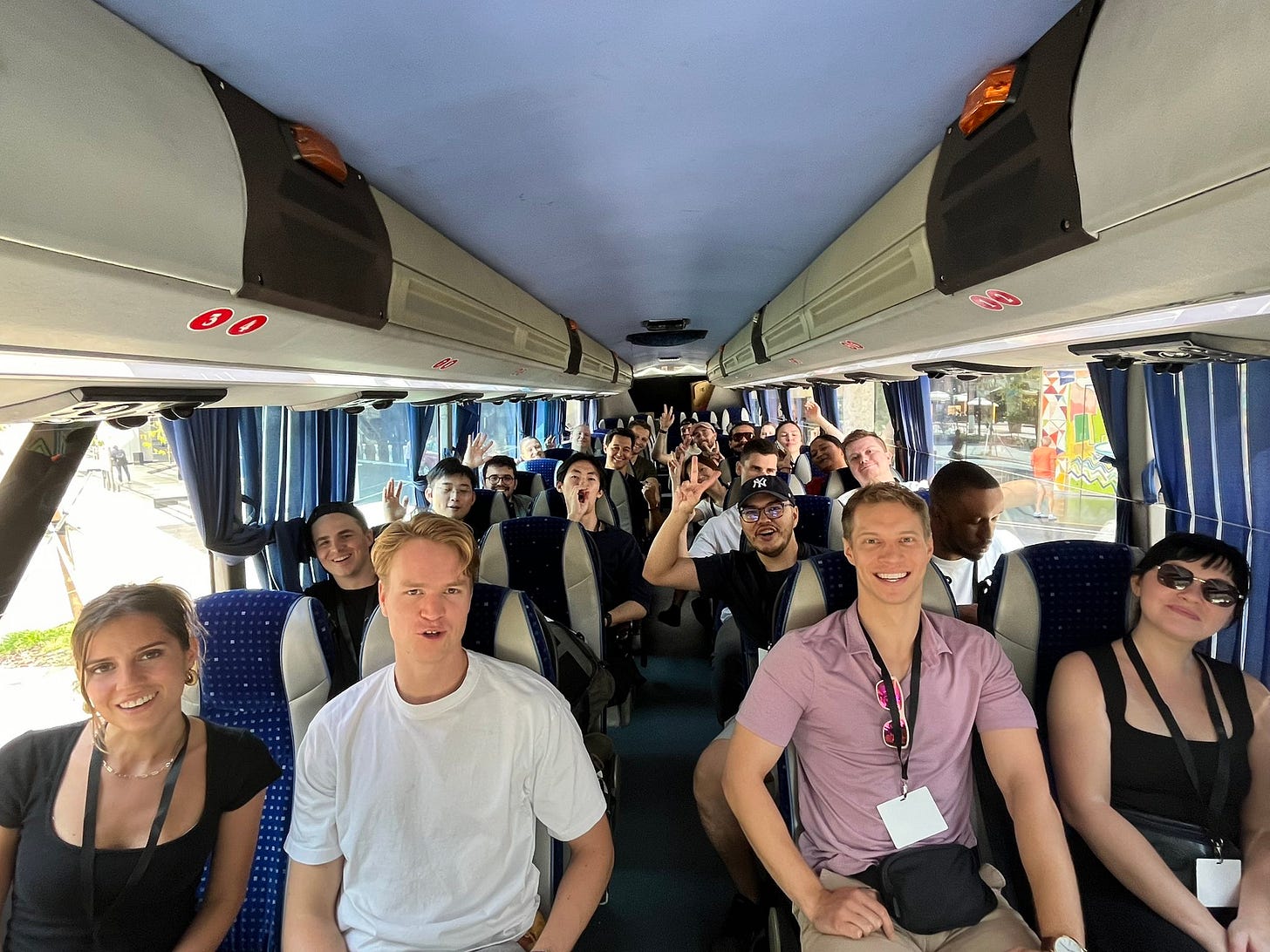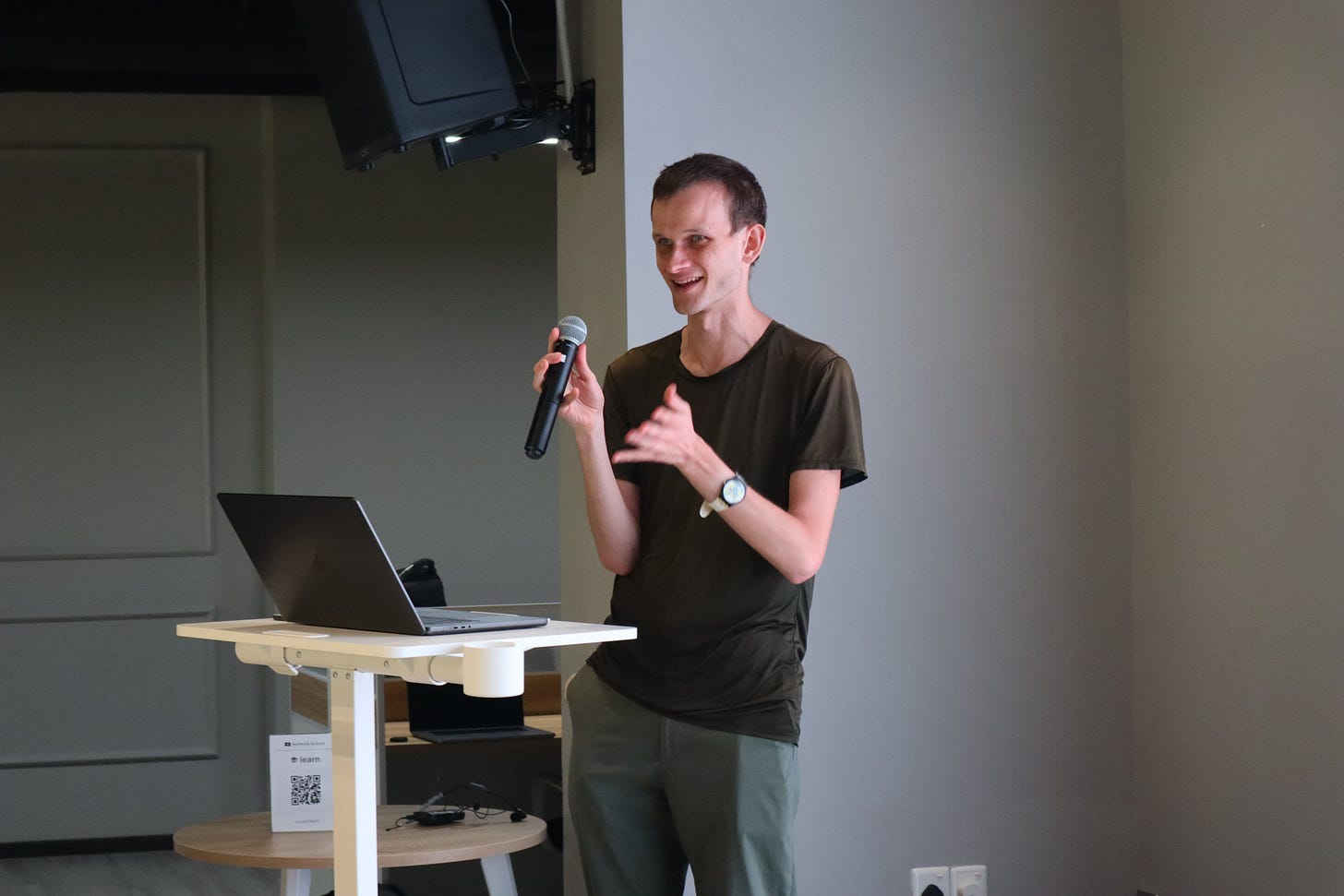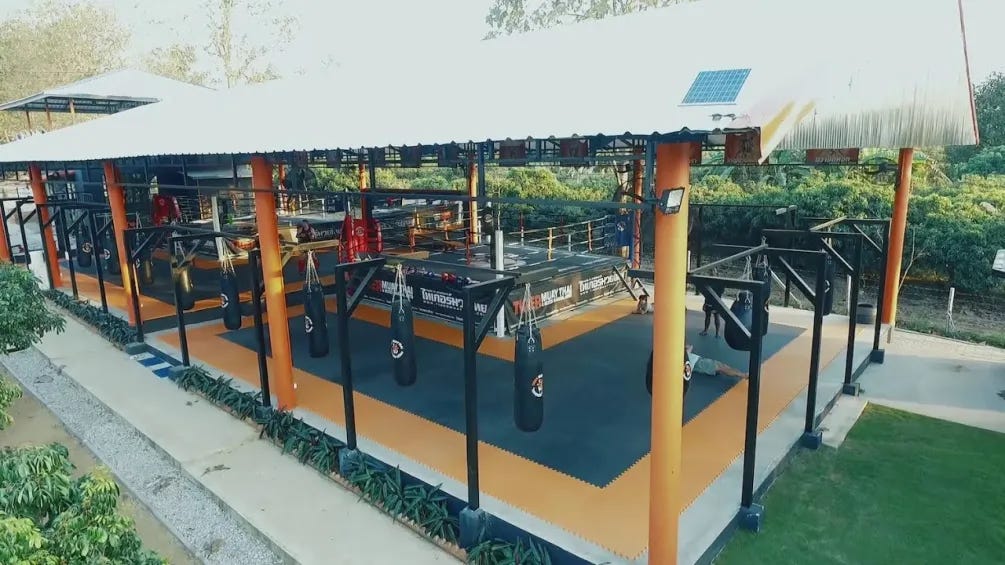Selamat datang to The Sunday Succulent.
I am currently writing this from my hotel balcony on a semi-deserted island shortly after watching the sun rise over Singapore across the Straits of Johor.
Before I get to the “what’s,” the “when’s,” and the “why’s,” a little housekeeping: I have moved The Sunday Succulent under a parent publication, 1525.
I plan to write more (skepticism warranted), and on topics beyond The Succ™, and this will help me remain organized.
If you’re reading this, you will receive both Succulent and non-Succulent related articles. There will not be a set cadence. You can obviously opt-out at any time.
Moving on.
In the original spirit of The Sunday Succulent, the primary purpose of this edition will be to more thoughtfully answer the question, “How’s it going?” for interested family and friends.
I suspect the recent uptick in this question comes from both intrigue and concern, primarily relating to my opening sentence.
So, where am I?
An island near Singapore.
More specifically, an island that was recently uninhabited coastal land prior to the $100B (yes, big B) Chinese Belt and Road Initiative development plan announced in 2006, launched in 2015, and largely abandoned by 2017. The vision was an eco-friendly metropolis designed to accommodate 700,000 residents.
Today, there are around 9,000 residents (i.e., 691,000 short of plan), giving it an eerie atmosphere that has earned it the nickname “ghost city.”
The background is interesting. Here are the spark notes:
The development was aimed at affluent buyers, particularly from China.
In 2017, Xi Jingping implemented capital controls restricting Chinese nationals from transferring more than $50,000 out of the country annually. (Effectively removing the opportunity to purchase available island properties ranging from $75,000 to $1M+.)
COVID-19 and local political instability further exacerbated the demand problem.
On August 25, 2023, the island became a Special Financial Zone (SFZ) to attract foreign investment and revitalize development.
On September 23, 2024, I arrived.
But why?
Here is the original email that set everything in motion.
I could count on two hands the number of people in the world who could send this email and deserve to be taken seriously. Balaji Srinivasan is at the top of the list.
For background, Balaji is an entrepreneur (with 9-figure exits), angel investor (GP at Andreessen Horowitz), professor (computational biology, statistics, computer science, engineering, and blockchain at Stanford), and author (The Network State).
I first heard him on this episode of The Tim Ferriss Show three and a half years ago, and he quickly earned a seat on my personal board of directors1. His association with the project sparked my curiosity; the characteristics of the program demanded my attention.
The full “why” exceeds the time and space we can dedicate here. But the most appealing aspects to me are the following:
The daily loop. If we’re being honest, it is hard to be the best version of ourselves. We spend so much time managing our day-to-day lives and meeting our material needs that our higher needs—community, hobbies, continuous learning, spiritual health—are often neglected. Indeed, even our foundational needs, like physical and emotional health, frequently get the scraps. If time is our most scarce resource (remember, we only have one go at this thing called life), then “I don’t have time to go to the gym” or “I don’t have time to shop for and cook a healthy meal” are actually valid concerns for most people in our time-poor modern society. Part of the vision here, at least how I interpret it, is to move as far up Maslow’s hierarchy in system one as possible. That’s to say, a community where access to healthy food, exercise, skill development, and quality sleep is as fundamental as access to running water.
Practical knowledge. It’s sort of a no-brainer to want to learn emerging technologies and humanities hands-on from some of the brightest minds in the entire world.
Win and help win. A philosophy different from both the right and the left’s respective versions of zero-sum thinking and libertarians’ “live and let live” doctrine, win and help win is a vision towards positive-sum outcomes.
Quality of participants. This was one that I was cautiously optimistic about coming in and have been blown away by in the first week. See below for more.
What are the people like?
“Are the people normal? Is it a cult?”
These were the initial questions from my distressed sister a couple of days after I arrived. I’ll attempt to answer both.
Q: Are the people normal?
A: No. I would not consider a former paratrooper turned human trafficking interceptor turned software engineer and prominent crypto voice “normal.” Nor would I consider “normal” a different special forces operator living in an off-the-grid village in the Colombian jungle who teaches animal flow and wants to seamlessly merge the beneficial aspects of technology into his otherwise technology-resistant community. Nor is the 30-something-year-old former Dutch central bank employee who learned to code by creating arbitrage bots that automatically facilitate trades across crypto exchanges while he sleeps, and who now operates a platform that gives unbanked individuals access to AI tools via crypto payments (and grew from 0 to tens of thousands of users in the past two months). Nor the Indian developer who builds complex applications in a single day, leads Vipassana meditation classes in the evening, and teaches non-developers how to code at night. Nor the Australian (lol, nor and Australians go together like PB&J) neuroscientist and biomedical engineer using AI to explore brain activity. I could go on, but I’m running out of steam and I think you get the point: no, the people here are not normal, and yes, that’s a feature.
Q: Is it a cult?
A: Good luck trying to brainwash this group. This is a collection of the most independent thinkers and non-conformists I’ve ever been around.
The standard participant is not your Stanford PhD (besides Balaji), but the breadth and depth of talent and intellect here is actually astounding.
It’s said that if you’re the smartest person in the room, you’re in the wrong room. If nothing else, I know I’m not in the wrong room.
Just for fun
Note: I am well aware that “the opposite of success isn’t failure; it is name-dropping” but I’m going to do it anyways, otherwise I won’t have sufficiently painted the picture of the surrealness of it all.
Within the first two hours of my arrival, I 1) hang out with Balaji on the beach, discussing the idea of setting up autonomous boats to shuttle back and forth to Singapore. 2) Then, I am the first to arrive for food, by about 20 minutes, and sit down with Bryan Johnson (and his team of three), Vitalik, and a staff member from the Network School. 3) During this time, a storm blows the doors open, and Vitalik, Bryan’s son Talmage, and I work together to keep them shut by wedging umbrellas between the doors and lining up tables to prevent them from blowing open and flooding the room, all while Bryan films it.
In July, my dad, uncle, and I rode our bikes from Indy to Lake James. During the ride, my uncle joked that he needed a “blood boy.” This was in reference to Bryan Johnson and his son. Two months later, I am having a meal with Bryan Johnson and his son.
It’s pretty cool to see how fast things are being built here by The Network School. And shout out to the Malaysian government for their innovation-forward approach to regulation.
Everyone here seems to be organizing something. My contributions have been persistently asking for a weight room leaderboard (this is my best shot at glory among this crowd) and organizing a “muggle power hour” for non-developers to try to learn to code using AI. The problem is, the MPH became a hit and now I’m committed to the power hour every M-F from 8:00 - 9:00 pm. Next project—we’re going to build an official tropical Network Dojo.
Until next time,
Sam
It’s impossible for anyone to be an expert or reason from first principles in all areas of life. That’s why it’s important to find individuals you trust—based on some combination of their credentials, track record, reputation among others you respect, and your own personal judgment—to help you filter out bad information and outright deceit (read: mainstream media). For guidance on fundamental questions, my "board of directors" mainly includes ancient figures like Jesus, Buddha, Seneca, and Marcus Aurelius, alongside more contemporary thinkers such as Anthony de Mello. For modern issues, I rely on contemporary voices, both living and deceased, such as Balaji Srinivasan, Richard Feynman, Abraham Lincoln, Naval Ravikant, Tim Ferriss, Benjamin Franklin, Peter Attia, David Deutsch, and Nassim Taleb.






Wow. What an amazing first week!
I am seeing it clearly now! Love the info on the succulent.